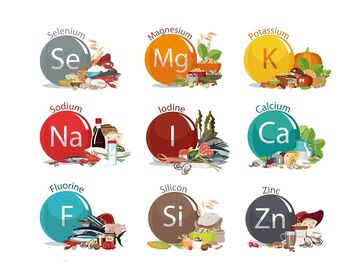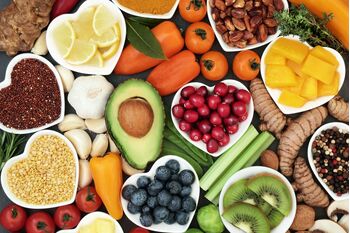GET 10% OFF YOUR FIRST ORDER
And be the first to hear about our new product drops!
Blog

Minerals and their importance in the human body?
Minerals are essential nutrients for human health because they are used for growth, development, movement, and energy production. We find two types of minerals; large metals and rare metals. Humans can take essential minerals through diet as well as through supplements. There are 13 types of minerals important to human health...

The benefits of Garlic
Garlic has many medical benefits that help heal many diseases and prevent others. Therefore, Doctors always advise you to eat garlic to improve your health. The benefits of eating garlic are: 1- Lowering cholesterol: Eating garlic helps maintain the natural equation between good and bad cholesterol. 2- Reducing the risk of blood clots:...

Your guide to improving your diet during the holy month!
The holy month not only comes with happiness, goodness, and blessings but also healthy habits. Ramadan, it’s known for increasing social visits between family, relatives, and friends, which Muslims take advantage of, celebrating their fasting during the day and gathering at one table at breakfast time. However, many Muslims neglect the main...

Your immunity is stronger with these foods
1 - Sweet red peppers/ Bell pepper: Bell pepper contains a large percentage of vitamin C which is essential for enhancing immunity. It is worth mentioning that it also contains beta-carotene, which promotes healthy skin and eyes. 2 - Acid fruits: Acidic fruits such as orange, grapefruit, tangerine, and lemon contain a large amount of vitamin...
Khalaf Al Otaiba 08 Feb 2022, 02:45 AM
Vitamin D
Vitamin D is both a nutrient we eat and a hormone our bodies make. It is a fat-soluble vitamin that has long been known to help the body absorb and retain calcium and phosphorus; both are critical for building bone. Also, laboratory studies show that vitamin D can reduce cancer cell growth, help control infections and reduce inflammation. Many of the body’s organs and tissues have receptors for vitamin D, which suggest important roles beyond bone health, and scientists are actively investigating other possible functions.
Few foods naturally contain vitamin D, though some foods are fortified with the vitamin. For most people, the best way to get enough vitamin D is taking a supplement because it is hard to eat enough through food. Vitamin D supplements are available in two forms: vitamin D2 (“ergocalciferol” or pre-vitamin D) and vitamin D3 (“cholecalciferol”). Both are also naturally occurring forms that are produced in the presence of the sun’s ultraviolet-B (UVB) rays, hence its nickname, “the sunshine vitamin,” but D2 is produced in plants and fungi and D3 in animals, including humans. Vitamin D production in the skin is the primary natural source of vitamin D, but many people have insufficient levels because they live in places where sunlight is limited in winter, or because they have limited sun exposure due to being inside much of the time. Also, people with darker skin tend to have lower blood levels of vitamin D because the pigment (melanin) acts like a shade, reducing production of vitamin D (and also reducing damaging effects of sunlight on skin, including skin cancer).

- Office 1, Al Zahara Building, Al Suq Al Kabeer , Dubai,
- +971-54-411-9999
- Mon-Sun 9.00 - 18.00
- info@germansupplements.net

© 2021-2024 German Supplements, LLC. *Disclaimer: Please note that German Supplements, LLC is not affiliated with any websites other than germansupplements.net.
We are not responsible for products sold or shipped from unauthorized sources. Read more »
